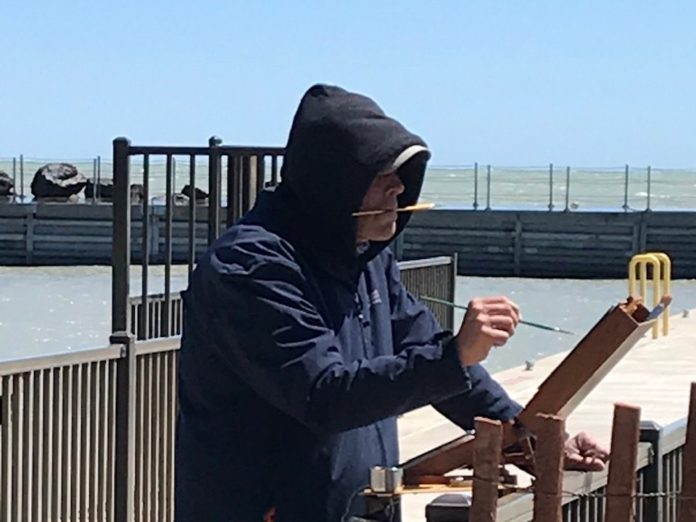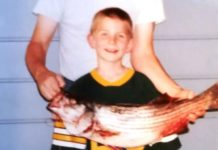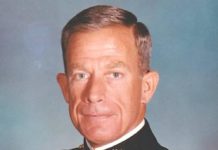The ancient Roman philosopher Seneca is supposed to have said, “Luck is what happens when preparation meets opportunity.” Mark Cleveland might be the best embodiment of this maxim as he shares his musical and artistic talents with friends, family and the many strangers he meets in his wide-ranging travels.
Many Evanstonians are familiar with Cleveland’s work as a musician, having seen and heard him perform around town. Musically, Cleveland is an autodidact who does not read music. He plays more than 20 different instruments, and presently focuses on Native American flute, guitar, harmonica and mandolin. Much of his musical exploration and growth started in earnest after he and his family were “adopted” by a Native American elder who stayed with them as a house guest while participating in a cultural exchange program. This deep friendship was Cleveland’s entrée to connecting more with his Native American heritage via the wisdom passed along from his maternal grandmother and the elders within the community.
That familial connection led Cleveland to get involved with the American Indian Center in Chicago, and then later the Trickster Cultural Center in Schaumburg where he is on the board and formerly served as president. According to the Center’s website, “In Native American culture, a trickster is a spiritual and cultural educator.” This non-profit promotes “Native arts, cultural education, and awareness,” but also serves as the primary organization in Illinois to advocate for Native American military veterans.
As Cleveland grew more involved with learning about and participating in Native American traditions and teachings, he turned to painting “as a way to understand the things I was experiencing.” An elder advised him that painting those kinds of experiences was disrespectful because the experiences are personal, so Cleveland stopped painting them and turned to composing music instead.
Within a few months, he had enough material for a CD. The result, “Songs for the Journey,” was released in 2003. It captures him “discovering his heritage and then describing it,” and led to a wide range of new musical experiences and opportunities to perform, such as performing with the Grammy award-winning musician Bill Miller, being invited to perform for the Dali Lama, and being invited to play in New Zealand as part of a cultural exchange with the Maori people. That exchange was prompted by the Chicago Field Museum’s decision to comply with an international petition requesting the repatriation of ancestral remains of the New Zealand Maori people.
This good fortune and seeming serendipity are not lost on Cleveland, who said philosophically, “I hate to be Oprah, but it’s like when you put something out in the universe that you’re supposed to do, you’re finally answering something, and then it kind of grabs you and takes hold. And if you just keep listening and answering, it happens the way it needs to.”
Cleveland’s other performing opportunities back up his philosophical outlook. He and his band have performed with Yo-Yo Ma’s Silk Roads Ensemble at the Harris Theatre in Millennium Park as part of the Tibetan National Culture Exhibition. Cleveland scored and played 27 tracks for the musical soundtrack accompanying the Ancient Americas exhibit at the Field Museum. Recently, Cleveland performed at the seventh annual National Gathering of American Indian Veterans, a conference that took place July 16 to 18 at Cantigny Park in Wheaton, Ill.
In addition to his individual musical contributions connected to his Native American roots, Cleveland also has a band. The Mark Cleveland Band (including Jordi Kleiner on fiddle, Bob Bechstein on percussion, Dave Miller on bass and Steve Martin on banjo and guitar) have performed at venues such as Schuba’s and Davenport’s around Chicago, Old Town School of Folk Music and at many Evanston fairs and festivals. The group, all good friends, has been together for more than 20 years. As Cleveland recalls, at one point there was an opportunity for the group to tour, but the idea of being away from their young families, sleeping in vans, and giving up their day jobs did not appeal to them at all. They made a decision to play for the joy and fun of making music with friends and performing for local audiences throughout the Midwest. Today the men are enjoying late-middle age and still love getting together to make music.
Cleveland is also a well-known artist who works in stained glass, pen and ink, and oils. Some may recall seeing him around Evanston with his easel. He paints in the en plein air (French for ‘the act of painting outdoors’) style, very reminiscent of Walter Burt Adams, an Evanston resident who painted local scenes from the 1930s to the 1970s. The en plein air technique is straightforward: Cleveland sits facing the scene he plans to paint and makes an excruciatingly detailed underpainting in brown oil paint. He uses a forced two-point perspective, creating an optical illusion that makes objects appear closer or larger than they are in reality. Eventually the sketch is filled in with color glazes and oil paints in a spectrum of colors. The result is a clearly identifiable local view full of color, vibrancy and feeling.
A recent gallery showing at 1100 Florence this past spring sold out quickly. The paintings bring much pleasure to both the viewer and the painter. Cleveland receives a steady stream of feedback via email messages and phone calls from people who share their memories with him, telling him how his painting or music connects to parts of their life and why it’s meaningful. A recent painting of a restaurant sign and building prompted a conversation with the painting’s new owner, who coincidentally happened to have grown up in an apartment above the restaurant. These memories bring connection between Cleveland and the people who confide in him; they make friends out of strangers.
Cleveland graduated from Northwestern with a degree in Organization and worked in a corporate job at Allstate for 30 years. He is retired from that life now, and is content to spend his time painting, playing music and being with his family. He is much more interested in experiences than possessions.
Last summer, the pandemic provided him the impetus to build up his garden, which became a refuge for him and his wife. A health scare a few years ago also brought an intense clarity for him about what truly matters, even though he had always known it comes down to family. He credits his wife for helping him navigate a tense few months of doctors’ appointments, a false cancer scare, and a highly risky operation. Fortunately, it all turned out well, and he has resumed one of his favorite hobbies, long-distance bike trips and fly fishing. In early July, he attempted a 750-mile, week-long bike trip with friends through the backcountry out west with the intended destination of Missoula, Montana. Unfortunately, a few days into the trip, Cleveland had to stop due to severe dehydration and heat exhaustion.
Another project keeping Cleveland busy this summer is a partnership with the Westfork Sportsman’s Club and Trout Unlimited as an Artist in Residence. Trout Unlimited, of which Cleveland is a member, is a non-profit organization dedicated to caring for and recovering rivers and streams throughout the United States. Cleveland will be working on pen and ink illustrations and oil paintings of his favorite streams and landscapes. All proceeds from the sale of these finished works will benefit stream remediation efforts. Additionally, he has also donated several pen and ink illustrations to Trout Unlimited to support Project Healing Waters Fly Fishing. Healing Waters Fly Fishing brings a high-quality, full-spectrum fly fishing program to disabled active military service personnel.
Most of Cleveland’s non-academic education comes from being a willing student of the people he meets. He also freely credits his wife, a long-time teacher at Dewey Elementary, and two adult daughters with helping teach him to listen and expanding his world view. Cleveland listens and observes intently, both people and environments. He pays attention. In the hyperconnected, digital world of today, that kind of focus is a lost skill. Further, he has taught himself to be receptive to these opportunities, and that makes all the difference.
Credit: Source link































